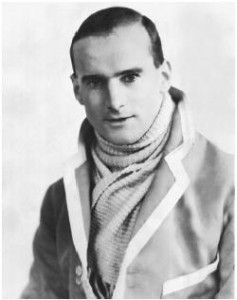
Photo from wikipedia.
On Tuesday I went to see Journey’s End at a packed Royal Centre. The play was described as ‘a world of candlelit fellowship in a hole in the ground’ by Robert Gore-Langton. But here I want to talk about the notable journey of the playwright Robert Cedric Sherriff.
Having started life as an insurance agent, Sherriff began writing plays to help raise funds for his beloved Kingston Rowing Club. After five years and five plays he realised he had another calling and started a more personal work on his experiences of the front line. Journey’s End originally started as a novel but later turned into a play set in a dugout near St Quentin in March 1918, just before the last great German offensive of the First World War. The play was sent to the agent Curtis Brown, frowned upon by George Bernard Shaw, and was only produced by the Incorporated Stage Society on 9 December 1928 because they had a free slot. But the odds were still stacked against it when James Whale, an untested director, took over the helm with a rudimentary set and miniscule budget. Reputable actors refused to risk their reputation on a controversial play from a relatively unknown playwright. But, as David Grindley points out, this ‘allowed the little-known actor Laurence Olivier to be cast as Stanthorpe and, without a star, the play remained the focus of attention.’
With many more dramas unfolding that are straight out of an Ealing play, public taste was eventually deemed more sophisticated than commercial managements gave it credit for. With insurmountable odds stacked against it, by the end of 1929, 14 companies were performing the play with 17 translations running in Europe. The rest, as they say, is history. Sherriff went on to pen classics such as Goodbye Mr Chips and The Dam Busters. Just as the most difficult problem of his cast in Journey’s End is the concealment of fear, so too the playwright has kept his nerve in the face of adversity: an equally motivating testament.
Like many of his generation, Sherriff loathed war but took great pride in his regiment for whom he would hold a lifelong affection. Although his own personal experiences of war were relatively quiet by some standards – he narrowly missed out on the Battle of Loos which saw a platoon massacred as they approached the unbroken wire of the German Line and then Delville Wood in 1916, which was an equally vicious bloodbath – he was hit in the face by fragments of a shell burst at the Third Battle of Ypres (Passchendaele) and returned home. However, he’d seen enough to write a play that perfectly strikes a balance between humour and tragedy with characters drawn from an amalgam of people he had lived aside. It is as resonant now as it was then because it does the one thing that all good writing does; it brings in the human dimension.
Without wishing to sound flippant, buying a poppy is an important cultural gesture but it’s an empty signifier if you’re unable to connect with the subject – a bit like clicking ‘like’ on a Facebook Group. Two hours and forty minutes of a sparsely lit stage and I was right there in with the cast and it felt like I’d been with them for years. The play is a master class in empathy and should be compulsory viewing for students – if you want them to realise why hanging off the Cenotaph is so offensive.
Given the emotional force of the play, I’m stunned that commercial companies of the day couldn’t see the public interest. It enabled families to grieve their loved ones – remembering that there was barely a British family untouched by a loss which just goes to show the complete lack of perception on the part of those with the financial clout to make a difference, even when the critics were telling them otherwise. I can think of no better motivation for a writer to rip up their rejection slips and persevere with their work than Sherriff’s story. As Christmas looms and the celebrity novels pack out the shelves of Asda, perhaps it’s time that agents and publishers remembered that the public are far more sophisticated in their tastes than they are given credit for and that the current no-frills approach to commercial success is a cheap, quick-fix solution that could be resolved by having a little bit more faith.
Journey’s End runs until Saturday 19 November. Read a review here.
If you enjoy the play and want to know more about boredom in the trenches, then read Orwell’s Homage to Catalonia

